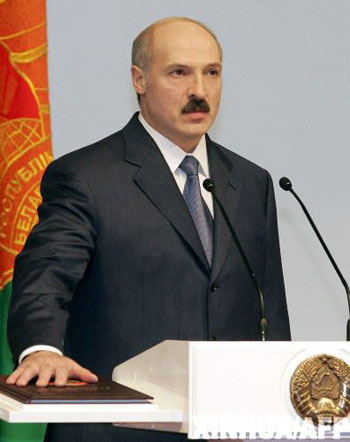
BY CAROLINE WRAY:
“Maybe it was too much. But I saw no choice,” said Belarusian President Alexander Lukashenko on Friday, October 10 in a conference with the Russian press. “A bandit will only listen when you talk to him in his language.”
Lukashenko, who has been president of Belarus (a small nation of 9.5 million to the Southwest of Russia and a former member of the Soviet Union) since 1994, directly admitted for the first time that he had commissioned Belarusian secret service members to work as members of “death squads” in the 1990s.
He referred specifically to groups instructed to attack Russian mafia members in Belarus, and mentioned a specific instance in particular.
“I had to make a radical decision,” he said, mentioning a “trap” that the group set targeted to capture and attack organized crime members. “All who resisted were shot on the spot. Three groups were killed, the fourth was not.”
According to the Russian Gazeta, this admission by Lukashenko seemed sudden, although the existence of “death squads” was already common knowledge, particularly given that organized crime in Belarus dropped dramatically in the late 1990’s with no spike in trials. Conspicuous.
Lukashenko seems unashamed of this activity; while he is often accused of being overly dictator-like, he has often brushed these accusations aside, having defended his actions by the decrease in crime since taking office. He claims that without his autocratic rule, Belarus would dissolve into chaos and instability and would experience much of the economic hardship of the other nations of the former Soviet Union.

He’s been known to make controversial comments before, including a statement comparing Belarus to Hitler’s Germany (in a good way) in 1995, a “Jew joke” gone awry in 2007, and saying to the gay German foreign minister “I’d rather be a dictator than gay” after the minister accused Lukashenko of being “Europe’s last dictator.”
Taking out mob bosses without a trial is questionable, certainly, but what has really upset the West has been the Belarusian State Security Agency’s tendency to make opposition leaders disappear. It may be interesting to note that the agency still goes by the Soviet name “KGB.”
This all caused quite a stir in 2001, when two ex-prosecutors, Dmitry Petrushkevich and Oleg Sluchek, informed journalists of a squad of 10 members (some former crime bosses themselves) who were responsible for murdering 30 of Lukashenko’s political opponents. The two men, who had fled Belarus and been granted political asylum in the United States, decided to come forward after other investigators died under suspicious circumstances, according to a 2001 BBC article.
The Lukashenko administration, of course, denied involvement in deaths of opposition leaders.
In 2006, President Bush began sanctions against Belarus and called a “national emergency” against the Eastern European country. Obama extended the sanctions last year. Also in 2006, then-Secretary of State Condoleezza Rice named it one of the world’s six outposts of tyranny, and the only one in Europe.
Caroline Wray ‘17 is in Jonathan Edwards College. She is a Globalist Notebook blogger on Russia. Contact her at caroline.wray@yale.edu.